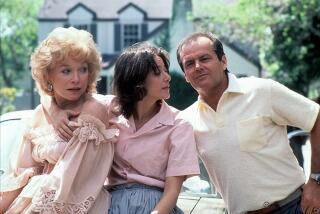A rose by any other name may smell as sweet, but is there uncommon dignity in a common name?
- Share via
Jack Smight, a film maker whose name is familiar from his many movie credits, writes to solace me about my problems in being named Jack Smith.
I used to spend hours in my youth imagining romantic names for myself, names that evoked my character, or the character I hoped to have: Quentin Randolph, Fulton Duffield, Marshall Kent, Lancelot Grant, Morgan Cortright. I would write them down and roll them about on my tongue.
Jack Smith is something of an embarrassment, being the most common name in the English-speaking world. I actually don’t mind its being common, since I have no pretensions; but I do mind being accused of having made it up to conceal my true identity--as if I had no more imagination than that.
How often in my younger years, when I registered at a hotel with my wife, did I notice the slight smirk of conspiracy on the face of the registration clerk, which somehow was transmitted to the bellman, who wore it up in the elevator, and, naturally, expected a larger tip, since he also was conniving at an illicit adventure.
What always ired me on these occasions was not the implicit suggestion that I was engaged in a sinful enterprise, but that I was such a dolt that I couldn’t think up a better phony name for myself than Jack Smith.
Fortunately, this contretemps rarely occurs anymore, because the young don’t think that a man my age could be committing a sin, and also because on checking in one is required to show the universal identification--a plastic credit card.
“My story is the reverse,” writes Jack Smight. “I yearn to have the name Smith back again. To explain: Many, many years ago, my father’s father, tiring of the pitfalls the name Smith produced, changed his name from Smith to Smight. No one could figure out how he arrived at the spelling. He always said “just think of it as might with an S in front of it.
“My father was the only one in the family who took the name for himself. The other siblings stayed with Smith. So, as it happened, I became Jack Smight. I am in the film business and I’ve had scripts sent to my home with the following names on the envelopes: Smite, Smythe, Smiget, Schweiht, Smeight, Smythy, Smithy, Schmidt, and Smeet.
“To make matters worse, when my reviews are good, the critics spell it Smith. So, as you can see, I’d be better off with your name.”
I see his point. But on the other hand, just the little bit of distinction that the name Smight confers may have had something to do with his success in Hollywood. There was for many years an art director in Hollywood named Jack Smith, and at least his grandfather’s folly kept Smight from being confused with him.
I don’t know how I managed to get married with a name like Jack Smith. My wife’s name, when I met her, was Denise Bresson, which was exotic enough. She didn’t know it at the time, but it had once been Dussarre-Bresson; but her grandfather had dropped the Dussarre.
When I was in school it was common for love-struck girls to spend their classroom time writing the names of their inamorata over and over in their notebooks, prefacing the unsuspecting lad’s name with the magic Mrs. I just don’t think a romantic young schoolgirl--for that is what she was--could have made the jump all the way from Denise Dussarre-Bresson to Mrs. Jack Smith. Without the hyphenation it must not have been so hard. In any case, she did it.
I had a chance to change my name when I first began writing this column--26 years years ago. Washington Irving Ramsdell, then editor of the editorial pages, who got me started, and a man, obviously, who appreciated a name of literary resonance, asked me what name I wanted to write under. I was already writing as a reporter under the name Jack Smith.
I was thrown into a maelstrom of possibilities. Here was a chance, at last, to reshape my image, my persona, perhaps my life. What would it be? Quentin Randolph? Fulton Duffield? Morgan Cortright? Any one of them would give me the luster I wanted. They exuded dignity, schooling, tradition; they would speak of famous soldiers in my background; of poets and great lovers and statesmen, and perhaps a famous Shakespearean actor or two.
And certainly a name like Quentin Randolph would add weight to anything I wrote.
But in the end I couldn’t do it.
I thought of my father, who had borne Smith proudly all his life; and of his father and all the Smiths before him. I thought of all the Smiths who had labored honorably at their anvils through the centuries to bring man out of the Stone Age. We Smiths were, after all, the forge upon which civilization had been shaped, and we were the shapers.
Besides, I was afraid that sooner or later, in a bar someplace, or at a social, I would encounter someone who had known me at school, or in the Civilian Conservation Corps, or in the Marines, and who would inevitably blurt it out:
“Why, son of a gun, if it isn’t old Jack Smith!”
Most of all, I worried that if I called myself Quentin Randolph, I would begin trying to think like a Quentin Randolph, and I didn’t know how a Quentin Randolph thought.
So I stayed Jack Smith; and what you see is what you get.
More to Read
Only good movies
Get the Indie Focus newsletter, Mark Olsen's weekly guide to the world of cinema.
You may occasionally receive promotional content from the Los Angeles Times.










